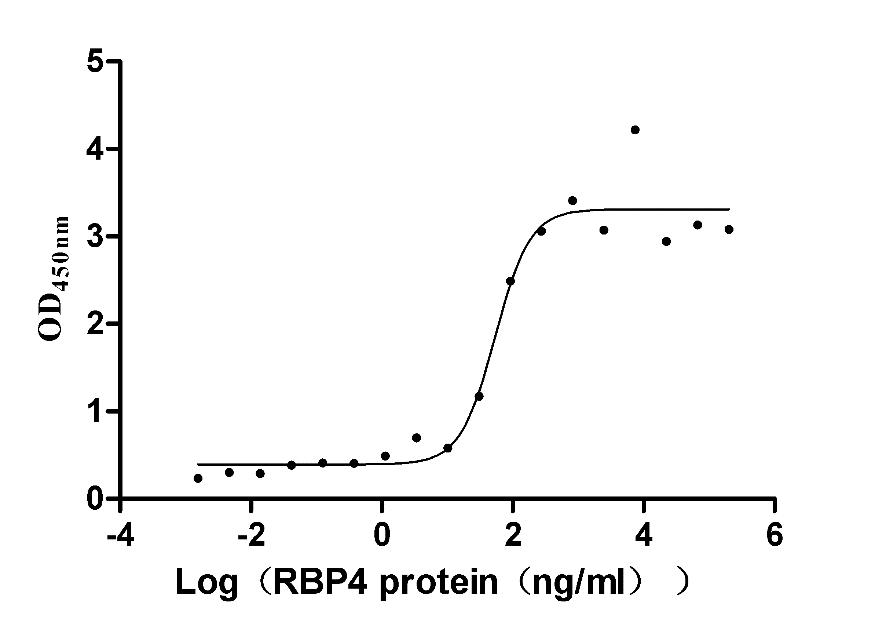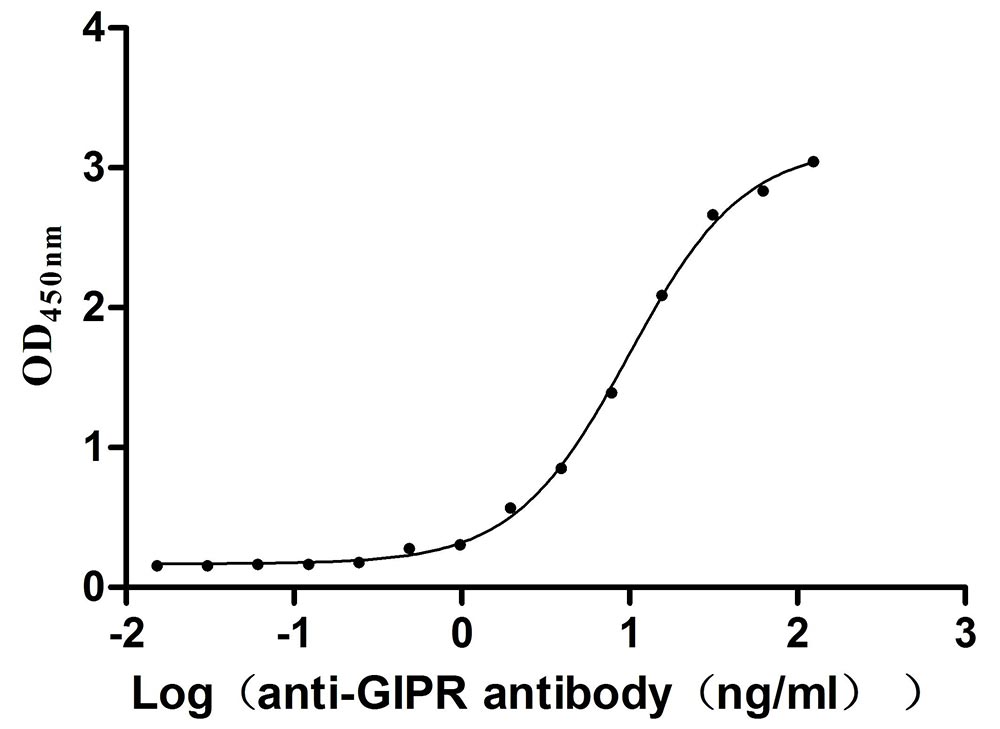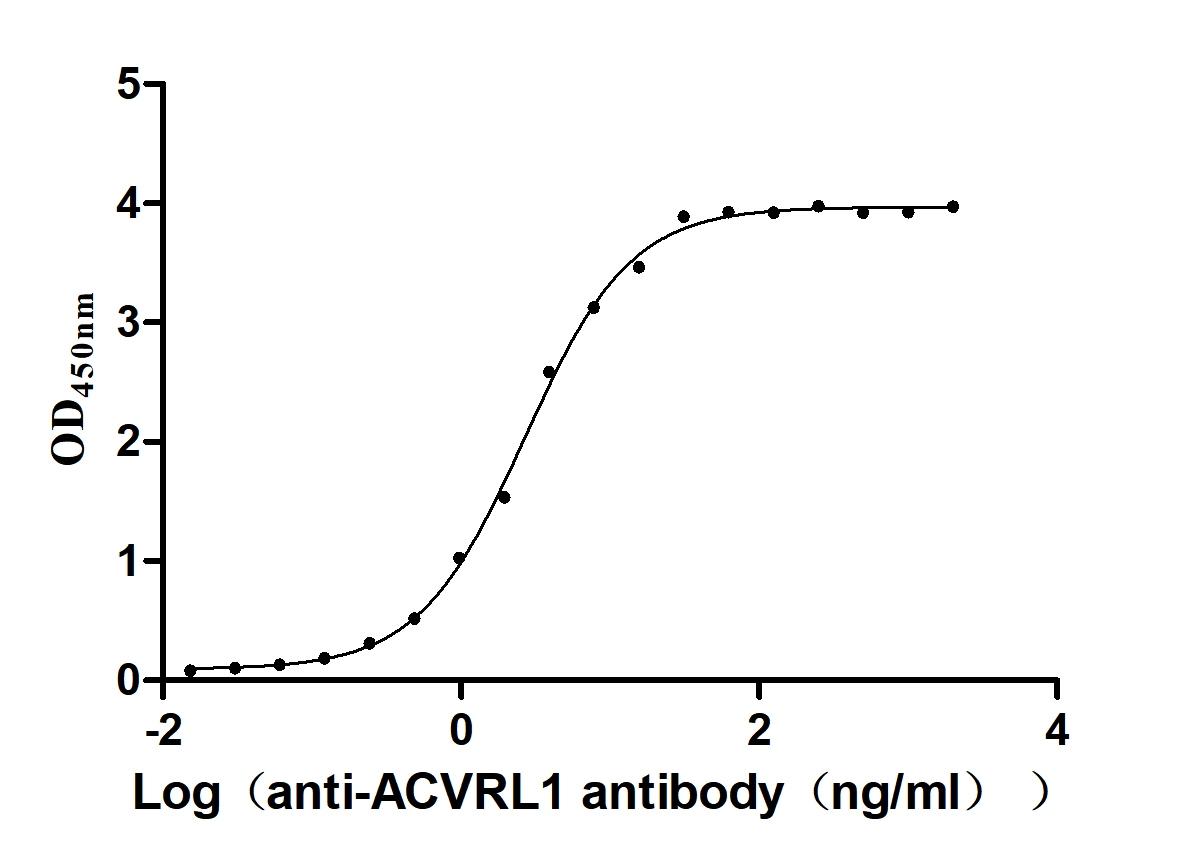Recombinant Human Programmed cell death protein 4 (PDCD4)
-
货号:CSB-YP703610HU
-
规格:
-
来源:Yeast
-
其他:
-
货号:CSB-EP703610HU
-
规格:
-
来源:E.coli
-
其他:
-
货号:CSB-EP703610HU-B
-
规格:
-
来源:E.coli
-
共轭:Avi-tag Biotinylated
E. coli biotin ligase (BirA) is highly specific in covalently attaching biotin to the 15 amino acid AviTag peptide. This recombinant protein was biotinylated in vivo by AviTag-BirA technology, which method is BriA catalyzes amide linkage between the biotin and the specific lysine of the AviTag.
-
其他:
-
货号:CSB-BP703610HU
-
规格:
-
来源:Baculovirus
-
其他:
-
货号:CSB-MP703610HU
-
规格:
-
来源:Mammalian cell
-
其他:
产品详情
-
纯度:>85% (SDS-PAGE)
-
基因名:PDCD4
-
Uniprot No.:
-
别名:Death up-regulated gene protein; Dug; H731; Ma3; MGC33046; MGC33047; Neoplastic transformation inhibitor; Neoplastic transformation inhibitor protein; Nuclear antigen H731; Nuclear antigen H731 like; Nuclear antigen H731 like protein; Nuclear antigen H731-like; PDCD 4; Pdcd4; PDCD4_HUMAN; Programmed cell death 4 ; programmed cell death 4 (neoplastic transformation inhibitor); Programmed cell death protein 4; Protein 197/15a; Protein MA-3; Tis; Topoisomerase-inhibitor suppressed protein
-
种属:Homo sapiens (Human)
-
蛋白长度:full length protein
-
表达区域:1-469
-
氨基酸序列MDVENEQILN VNPADPDNLS DSLFSGDEEN AGTEEIKNEI NGNWISASSI NEARINAKAK RRLRKNSSRD SGRGDSVSDS GSDALRSGLT VPTSPKGRLL DRRSRSGKGR GLPKKGGAGG KGVWGTPGQV YDVEEVDVKD PNYDDDQENC VYETVVLPLD ERAFEKTLTP IIQEYFEHGD TNEVAEMLRD LNLGEMKSGV PVLAVSLALE GKASHREMTS KLLSDLCGTV MSTTDVEKSF DKLLKDLPEL ALDTPRAPQL VGQFIARAVG DGILCNTYID SYKGTVDCVQ ARAALDKATV LLSMSKGGKR KDSVWGSGGG QQSVNHLVKE IDMLLKEYLL SGDISEAEHC LKELEVPHFH HELVYEAIIM VLESTGESTF KMILDLLKSL WKSSTITVDQ MKRGYERIYN EIPDINLDVP HSYSVLERFV EECFQAGIIS KQLRDLCPSR GRKRFVSEGD GGRLKPESY
-
蛋白标签:Tag type will be determined during the manufacturing process.
The tag type will be determined during production process. If you have specified tag type, please tell us and we will develop the specified tag preferentially. -
产品提供形式:Lyophilized powder
Note: We will preferentially ship the format that we have in stock, however, if you have any special requirement for the format, please remark your requirement when placing the order, we will prepare according to your demand. -
复溶:We recommend that this vial be briefly centrifuged prior to opening to bring the contents to the bottom. Please reconstitute protein in deionized sterile water to a concentration of 0.1-1.0 mg/mL.We recommend to add 5-50% of glycerol (final concentration) and aliquot for long-term storage at -20℃/-80℃. Our default final concentration of glycerol is 50%. Customers could use it as reference.
-
储存条件:Store at -20°C/-80°C upon receipt, aliquoting is necessary for mutiple use. Avoid repeated freeze-thaw cycles.
-
保质期:The shelf life is related to many factors, storage state, buffer ingredients, storage temperature and the stability of the protein itself.
Generally, the shelf life of liquid form is 6 months at -20°C/-80°C. The shelf life of lyophilized form is 12 months at -20°C/-80°C. -
货期:Delivery time may differ from different purchasing way or location, please kindly consult your local distributors for specific delivery time.Note: All of our proteins are default shipped with normal blue ice packs, if you request to ship with dry ice, please communicate with us in advance and extra fees will be charged.
-
注意事项:Repeated freezing and thawing is not recommended. Store working aliquots at 4°C for up to one week.
-
Datasheet :Please contact us to get it.
相关产品
靶点详情
-
功能:Inhibits translation initiation and cap-dependent translation. May excert its function by hindering the interaction between EIF4A1 and EIF4G. Inhibits the helicase activity of EIF4A. Modulates the activation of JUN kinase. Down-regulates the expression of MAP4K1, thus inhibiting events important in driving invasion, namely, MAPK85 activation and consequent JUN-dependent transcription. May play a role in apoptosis. Tumor suppressor. Inhibits tumor promoter-induced neoplastic transformation. Binds RNA.
-
基因功能参考文献:
- Study established that upregulation of miR-96 in glioblastoma multiforme (GBM) cells confers radioresistance via targeting PDCD4, which might be a potential therapeutic target for GBM. PMID: 30066909
- This study revealed a dynamic regulatory relationship between PDCD4 and critical factors for EMT, establishing a broad, functional role for PDCD4 in laryngeal carcinoma, which may be propagated by the STAT3-miR-21 pathway. PMID: 29510060
- the localization of Pdcd4 to the cytoplasm may be responsible for the suppression of the target mRNA translation and apoptosis. PMID: 29442268
- PDCD4 and PTEN were the functional targets of miR-21. PMID: 30074182
- Various studies support evidence that PDCD4, is a novel tumor suppressor gene, and is downregulated or even absent in colorectal cancer (CRC) and suppresses CRC deterioration. [review] PMID: 30243936
- In the high malignant group the PDCD4 mRNA and PDCD5 mRNA expressions were significantly decreased compared with the low malignant group and the control group. PDCD4 mRNA and PDCD5 mRNA expressions are promising targets for the diagnosis and treatment of glioma. PMID: 29921407
- miR-21 may promote salivary adenoid cystic carcinoma progression via PDCD4 and PTEN down-regulation and Bcl-2 up-regulation. PMID: 29328455
- The expression of PDCD4 is decreased in cervical cancer tissues, compared to miR-150 which is increased. PMID: 29091902
- Our study demonstrated that lncRNA-XIST, which acts as a miRNA sponge, impedes miR-21-5p to maintain the expression of PDCD4, which contributes to the progression of osteosarcoma (OS). Our findings suggest that the newly identified XIST/miR-21-5p/PDCD4 axis could be a potential biomarker or therapeutic target for OS. PMID: 29048648
- miR206 promoted the onset of SANFH by inducing apoptosis and suppressed the proliferation of osteoblasts, which was dependent on the inhibition of PDCD4. PMID: 29115490
- Results found PDCD4 as a target gene of miR-93 and miR-93 could down-regulate the expression of PDCD4 by directly targeting its 3'-UTR. The re-expression of PDCD4 could attenuate the hepatocellular carcinoma (HCC) cell invasion and migration induced by miR-93, while the knockdown of PDCD4 would promote HCC cell migration and invasion via the EMT pathway. PMID: 28748353
- Reduced expression of PDCD4 was found in decidual and chorionic tissues, and peripheral blood mononuclear cells from patients with missed abortion. PMID: 29017439
- miR503 promotes tumour growth and invasion by directly targeting PDCD4. PMID: 28849168
- A novel mechanism of Pdcd4 action as a translation inhibitor and tumor suppressor has been proposed. PMID: 28853972
- Taken together, this study highlights an important role for miR-23a/b as oncomiRs in gastric cancer through the inhibition of PDCD4 translation. These findings may shed new light on the molecular mechanism of gastric carcinogenesis and provide a new avenue for gastric cancer treatment. PMID: 28981115
- lncRNA CASC9 functions as an oncogene by negatively regulating PDCD4 expression through recruiting EZH2 and subsequently altering H3K27me3 level. Our study implicates lncRNA CASC9 as a valuable biomarker for ESCC diagnosis and prognosis. PMID: 28854977
- Exosomes derived from cisplatin-resistant OSCC cells transferred miR-21 to oral squamous cell carcinoma (OSCC) parental cells and induced cisplatin resistance by targeting phosphatase and tensin homolog (PTEN) and programmed cell death 4 (PDCD4). PMID: 28910982
- These results indicate that the ROS-STAT3-miR-21-PDCD4 signaling axis plays an important role in arsenic -induced carcinogenesis. PMID: 27876813
- PDCD4 is expressed in the cytoplasm of glandular epithelium of control endometrium and varied during the cycle changes of endometrium. Compared with the proliferative phase of control endometrium, PDCD4 expression was down-regulated in proliferative phase of eutopic or ectopic endometrium. There was no cyclic variation of PDCD4 expression in eutopic endometrium of adenomyosis patients due to progesterone resistance. PMID: 27765271
- Study confirmed that PDCD4 was downregulated in non-small cell lung cancer (NSCLC). PDCD4 is a functional target for miR-155 at both transcriptional and post-transcriptional levels. PMID: 28842954
- We demonstrated that miR-208a-3p suppressed apoptosis in gastric cancer cells by targeting PDCD4. PMID: 27634902
- PDCD4 is involved in negative control of stromal fibroblasts conversion into cancer associated fibroblast PMID: 27542230
- Results identify PDCD4 as a novel RSK substrate. s demonstrate that RSK-mediated phosphorylation of PDCD4 at S76 promotes PDCD4 degradation. PMID: 27028868
- evaluate the relative expression levels of miR-196a2 and three of its selected apoptosis-related targets; ANXA1, DFFA and PDCD4 in a sample of GI cancer patients PMID: 29091952
- In colorectal cancer tissues, the Sin1 protein but not mRNA was significantly upregulated while Pdcd4 protein was downregulated, suggesting that loss of Pdcd4 might correlate with Sin1 protein level but not mRNA level in colorectal cancer. PMID: 28692058
- miRNA-96 is significantly overexpressed in glioma tissues. Moreover, miRNA-96 plays a critical role in apoptosis by inhibiting the expression of PDCD4 in glioma. PMID: 26846266
- Supporting the clinical relevance of our results, we found an inverse correlation between ErbB-2/Stat3 nuclear co-expression and PDCD4 expression in ErbB-2-positive primary invasive breast cancer PMID: 26212010
- this study highlights an oncomiR role for miR-181b in regulating PDCD4 in colorectal cancer and suggests that miR-181b may be a novel molecular therapeutic target for colorectal cancer. PMID: 27647131
- Higher PDCD4 expression plays a role in polycystic ovary syndrome by affecting obesity, insulin resistance, lipid metabolism disorders, and granulosa cell apoptosis. PMID: 26868993
- results revealed that microRNA 200a inhibits erythroid differentiation by targeting PDCD4 and THRB PMID: 27734462
- The expression of miR-21 and PDCD4 at messenger RNA level was evaluated by quantitative real-time polymerase chain reaction, while the protein level of PDCD4 was determined by Western blotting. s found that locked nucleic acid-anti-miR-21 transfection was associated with a significant reduction in metastatic properties as assessed by the in ovo model. PMID: 28347230
- Data indicate that programmed cell death 4 (PDCD4) was identified to be a target of ubiquitin-specific protease 4 (USP4), which plays a role as a tumor suppressor. PMID: 27430936
- PDCD4 down-regulation is involved in the progression of several types of solid tumor. PMID: 27852288
- Results show that exosome-shuttling miR-21 represses PDCD4 protein expression by binding to 3'-UTR in esophageal cancer cells. PMID: 27035745
- miR-21, acting on PDCD4, which interacts with Twist1 and represses the expression of Twist1, contributes to the EMT induced by arsenite in transformed bronchial epithelial cells. PMID: 25445583
- Data show that microRNA miR-93 directly binds to the 3' untranslated regions (3'-UTR) of the programmed cell death 4 (PDCD4) mRNA transcript and inhibits PDCD4 translation in gastric cancer cells PMID: 27021515
- miR-21 can confer drug resistance to 5-FU in pancreatic cancer cells by regulating the expression of tumor suppressor genes, as the target genes of miR-21, PTEN and PDCD4 can rescue 5-FU sensitivity and the phenotypic characteristics disrupted by miR-21. PMID: 26864640
- In HeLa cells, phosphorylation of HuR by ERK8 prevents it from binding to PDCD4 mRNA and allows miR-21-mediated degradation of PDCD4. PMID: 26595526
- miR-183 maybe functions as an oncogene by regulating gastric cancer cell proliferation, apoptosis and metastasis and the oncogenic effect of miR-183 may relate the direct targeting PDCD4 PMID: 26961483
- PDCD4 inhibits cell growth through PI3K/Akt signaling in non-small cell lung cancer. PMID: 26802652
- This study describes the regulation of PDCD4 specifically in tonsil SCC by miR-499 and miR-21 and has documented the loss of PDCD4 in oropharyngeal squamous cell carcinoma PMID: 26867589
- Unprecedentedly, HuR was also found to bind to miR-21 directly, preventing its interaction with the PDCD4 3'-UTR, thereby preventing the translation repression of PDCD4. PMID: 26189797
- miR-21 has a role in upregulating PTEN, RECK and PDCD4 in glioma PMID: 26284486
- PDGF-BB stimulates cell proliferation through microRNA-21-mediated PDCD4 down-regulation, leading to the development of TAO. PMID: 26943153
- Results indicated that PDCD4 may be a novel candidate of tumor suppressor gene in hepatocellular carcinoma and that promoter hypermethylation is an important mechanism for its downregulation and a good predictor of survival. PMID: 26871813
- These findings suggest that miR-21 and PDCD4 might be potential biomarkers for malignant melanoma and might provide treatment targets in the future. PMID: 26150475
- We propose that SRSF3 could act as a coordinator of the expression of PDCD4 protein via two mechanisms on two alternatively spliced mRNA isoforms. PMID: 26773498
- Low PDCD4 increases osteosarcoma cells resistance to apoptosis. PMID: 26276504
- These findings support the feasibility of future efforts for diagnosis and gene therapy for prostate cancer that are based on IL-6, miR-21, and PDCD4. PMID: 26252635
- RT-qPCR and western blotting showed that miR-183 negatively regulated PDCD4 protein expression but had no impact on mRNA expression of PDCD4 PMID: 26063221
显示更多
收起更多
-
亚细胞定位:Nucleus. Cytoplasm.
-
蛋白家族:PDCD4 family
-
组织特异性:Up-regulated in proliferative cells. Highly expressed in epithelial cells of the mammary gland. Reduced expression in lung cancer and colon carcinoma.
-
数据库链接:
HGNC: 8763
OMIM: 608610
KEGG: hsa:27250
STRING: 9606.ENSP00000280154
UniGene: Hs.711490
Most popular with customers
-
Recombinant Mouse Retinol-binding protein 4 (Rbp4) (Active)
Express system: Mammalian cell
Species: Mus musculus (Mouse)
-
Recombinant Human Claudin-6 (CLDN6)-VLPs (Active)
Express system: Mammalian cell
Species: Homo sapiens (Human)
-
Recombinant Human Microtubule-associated protein tau (MAPT) (Active)
Express system: Mammalian cell
Species: Homo sapiens (Human)
-
Recombinant Mouse Gastric inhibitory polypeptide receptor (Gipr), partial (Active)
Express system: Mammalian cell
Species: Mus musculus (Mouse)
-
Recombinant Human Serine/threonine-protein kinase receptor R3 (ACVRL1), partial (Active)
Express system: Baculovirus
Species: Homo sapiens (Human)



-AC1.jpg)
-AC1.jpg)












